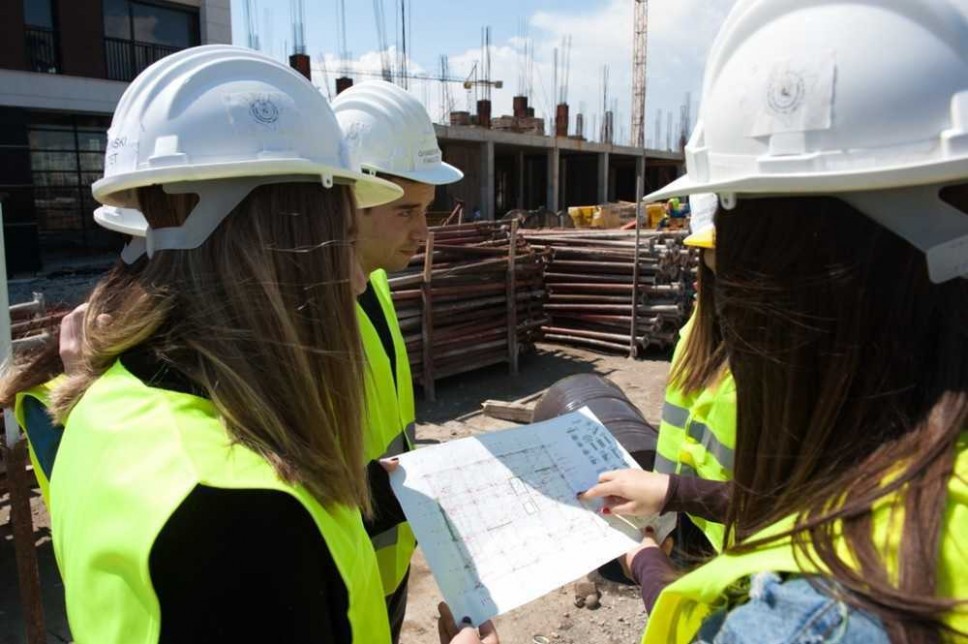Dekanka Rakočević: Na Građevinskom fakultetu najbolji vid provjere znanja je u učionici

„S obzirom na karakter materije, tip i sadržinu predispitnih provjera znanja i broj studenata, u mjeri u kojoj specifičnost studija na našem fakultetu to dozvoljava, Građevinski fakultet je spreman za onlajn polaganje predispitnih provjera znanja, kao i polaganje završnih ispita u prostorijama Univerziteta Crne Gore, kad za to bude uslova, s obzirom na aktuelnu situaciju pandemije uzrokovane virusom COVID-19, a u skladu sa odlukom Senata UCG“. To je kazala dekanka ovog fakulteta prof. dr Marina Rakočević.
Kurikulumima predmeta na Građevinskom fakultetu su, dodaje ona, predviđena dva tipa predispitnih provjera znanja: kolokvijumi i kontinuirano praćenje rada studenata tokom semestra, kroz izradu semestarskih, seminarskih i grafičkih radova.
„Od samog početka onlajn nastave, uz intenzivirani rad i studenata i nastavnog osoblja, te stalnu elektronsku komunikaciju, us pješno je organizovana izrada i odbrana semestarskih, seminarskih i grafičkih radova, koja je prethodno bila započeta u prvim sedmicama semestra, u uslovima klasične nastave“, navodi Rakočević.
pješno je organizovana izrada i odbrana semestarskih, seminarskih i grafičkih radova, koja je prethodno bila započeta u prvim sedmicama semestra, u uslovima klasične nastave“, navodi Rakočević.
Ona ističe da, imajući u vidu brojno stanje studenata i karakter kolokvijuma Građevinskog fakulteta, sa pretežno pismenom izradom računsko-grafičkih zadataka u kombinaciji sa usmenom provjerom znanja, za većinu predmeta nije moguće organizovati kvalitetne, mjerodavne i validne provjere znanja ovog tipa, osim na klasičan način – u učionici, kad za to bude uslova.
„Na određenom broju predmeta, uglavnom na specijalističkim studijama, sa malim brojem studenata, odlučili smo se za onlajn kolokvijume i već ih uspješno realizujemo. Uglavnom se radi o onlajn pismenom polaganju i to putem mejla (u vrijeme kada je zakazano polaganje, nastavnik mejlom dostavlja studentima zadatke; studenti imaju vremenski rok (npr. dva, tri sata...) u okviru kojeg mejlom treba da pošalju nastavniku svoje radove (skenirane ili fotografisane), uz izjavu da su radili samostalno); u virtuelnoj Zoom učionici (na način da nastavnik/saradnik vizuelno prati studente dok rade kolokvijum (na papiru ili na računaru), uz dostavljanje radova mejlom, kao u prethodnoj opciji); putem testova na Moodle platformi“, objašnjava dekanka Rakočević.
Onlajn polaganje kolokvijuma, dodaje ona, uglavnom je organizovano na predmetima na kojima kolokvijumi nose do 50% od ukupnog broja bodova, pri čemu se polaganje organizuje u manjim grupama.
„Sveobuhvatniji kolokvijumi, kao i kolokvijumi na predmetima sa velikim brojem studenata, ili pak oni za koje kurikulumi predviđaju kombinaciju pismenog i usmenog polaganja, a za koje onlajn polaganje nije racionalno, ni za studente ni za nastavnike, biće organizovani na klasičan način, u pravoj učionici, kad se za to steknu uslovi, neposredno prije završnih ispita. Pri tome, u saradnji sa predstavnicima studenata biće pažljivo pripremljen raspored svih provjera znanja kako bi se obezbijedili što je moguće bolji uslovi za studente“, najavila je dekanka Rakočević.
Nastavni proces na Građevinskom fakultetu se i dalje odvija onlajn, putem mejla, platformi i aplikacija Skype, Viber, Zoom i Moodle.
„Sada slijedi četrnaesta nedjelja nastave, i osma nedjelja kako se nastava izvodi onnlajn, i možemo reći da smo zadovoljni sa postignutim, naravno u mjeri u kojoj je to moguće u navedenim okolnostima. Iako smatramo da su prava učionica i neposredni kontakt, odnosno interakcija studenata i nastavnog osoblja, teško zamjenjivi u kvalitetnom obrazovnom procesu, očigledno je da su i studenti i zaposleni na Građevinskom fakultetu uložili izuzetan napor da i u ovim specifičnim uslovima rada nastavni proces teče bez značajnih zastoja i sa nesmanjenim kvalitetom“, smatra dekanka Rakočević.
Ona je naglasila da su nastavnici, saradnici i studenti zajedno prošli kroz period prilagođavanja novonastalim okolnostima.
„Iz sedmice u sedmicu, uz pomoć i sugestije studenata, čiji odziv nije bio manji u odnosu na uslove klasične nastave, prilagođavali smo i unapređivali načine prezentacije nastavnih materijala zahtjevima i potrebama studenata. Iako se isti tip onlajn nastave ne može primijeniti za sve predmete, kao i za sve nivoe studija, uspjeli smo naći primjenljive modele što je zahtjevalo veliku posvećenost svih učesnika. Zajedno smo se suočili sa izazovom onlajn nastave i smatramo da smo isti valjano savladali, te da će to potvrditi uspjeh naših studenata kako na predispitnim provjerama znanja, tako i na završnim ispitima“, zaključuje Rakočević.
Medijske objave:

